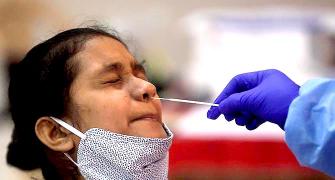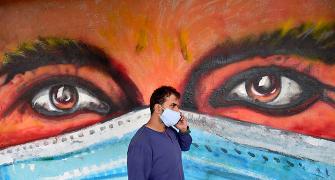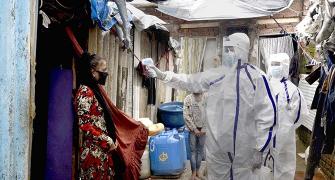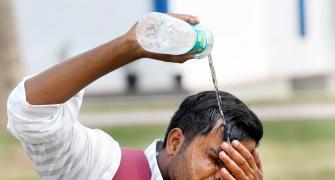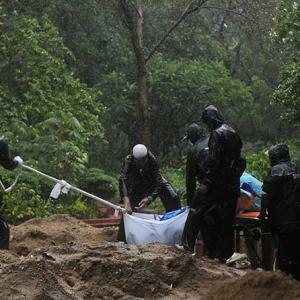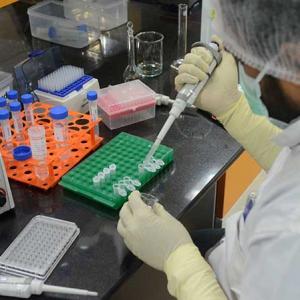As many as 30 states and Union Territories have COVID-19 positivity rate lower than that of the national average which stands at 8.07 per cent, the Centre said on Tuesday, emphasising that its ultimate aim was to maintain the aggressive testing and bring down the positivity rate to below 5 per cent.
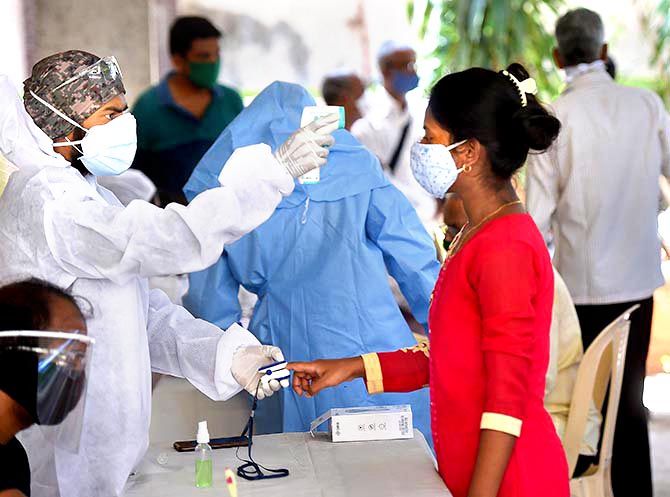
India's COVID-19 fatality rate has dropped significantly to 2.43 per cent from 3.36 per cent on June 17 due to effective clinical management of coronavirus cases, the health ministry and asserted that the country has handled the pandemic 'relatively well'.
19 states and UTs are performing more than 140 tests per day per million population as per the World Health Organisation (WHO) guidance, Rajesh Bhushan, officer on special duty in the Union health ministry, said at a press briefing in New Delhi.
"Just doing tests is not enough, they have to be done at a level of 140 tests per day per million so that the rate of positivity reduces and comes down to 10 per cent first and then continue that level of testing so that the rate of positivity further reduces to 5 per cent or lower," he said.
"So that is the ultimate aim, to maintain this level of testing and bring positivity down to 5 per cent eventually or even lower than that," he said.
30 states and UTs have COVID-19 positivity rate lower than that of the national average which stands at 8.07 per cent, Bhushan said.
States having lower positivity than the national average include Rajasthan (2.46 per cent), Madhya Pradesh (3.9 per cent), Assam (4.03 per cent), Uttar pradesh (4.06 per cent), Andhra Pradesh (4.16 per cent), Haryana (6.47 per cent), West Bengal (6.94 per cent) Karnataka (7.29 per cent).
On some states claiming that there is community transmission happening in their areas, Bhushan said the WHO has not given any standard definition of community transmission.
It permits that its member nations can, based on their own analysis of the situation, assess the spread of the disease and do its reporting which the global body shows on its website, he said.
Broadly, if it is not possible to trace the transmission chain, then it means that there is community transmission, Bhushan said.
"We have been telling that in our country, there are clusters of cases and there are pockets of localised transmission. That is our stand even now," he said.
Bhushan, however, asserted that it was not important what kind of transmission was happening, what was important was what action was being taken at the ground level.
"We have repeatedly been telling states to focus on effective containment and surveillance, house-to-house surveys, increasing the testing and timely treatment of positive cases so that we can bring the mortality rate from 2.4 down to 1 per cent," he elaborated.
In India, the COVID-19 deaths per million population stand at 20.4 per million, which is amongst the lowest in the world, Bhushan said.
"There are several countries where the deaths per million is 21 times or 33 times higher than in India. The global average stands at 77 deaths per million population," he said.
"So far, the nation has managed COVID-19 relatively well. The government of India is cooperating with all states and UTs. All decisions are being taken based on science and evidence-based inputs and in consultation with domain knowledge experts," Bhushan said.
On the testing done in Delhi, Bhushan said on an average 9,000-9,500 tests were conducted per day in Delhi in the first week of June and Delhi's positivity rate was 37 per cent then.
At that time, it was said that lakhs of cases would come. The Centre consulted certain domain experts, who held talks with the Delhi government, and a strategy was formed and it was decided that tests have to be increased, he said.
The strategy which focused on better containment, surveillance, house-to house searching, increased testing and effective management of positive cases led to the present improved situation in Delhi, he said.
Asked if Delhi had passed the peak going by the sero-survey findings and the current trends in Delhi, Director of the National Centre for Disease Control (NCDC) Dr Sujeet Kumar Singh said that this cannot be said as yet as there is a susceptible population present and virus can infect them.
NITI Aayog member V K Paul said there is a need to remain vigilant so that cases do not rise again.
"Peak is also in our hands and if we have reached at this stage then we should make it even tougher for virus infection to increase," he said.
India will ensure regulatory facilitation and actively consider supplementing resources if needed for expediting the Serum Institute of India's phase 3 trial of a COVID-19 vaccine candidate developed by the Oxford University, Paul said.
He also said that two indigenous vaccines are in Phase I and II of the human trials in the country.
India recorded 37,148 COVID-19 cases in the last 24 hours, pushing its tally to 11,55,191 , while the total number of recoveries increased to 7,24,577, according to Union health ministry data issued on 8 am Tuesday.
The death toll due to the disease rose to 28,084 with 587 fatalities reported in a day, the data showed.
The recovered cases among COVID-19 patients to 7,24,577, as on date, while there are 4,02,529 active cases and all are under medical supervision.
The recovery rate has further improved to 62.72 per cent, the ministry said.

